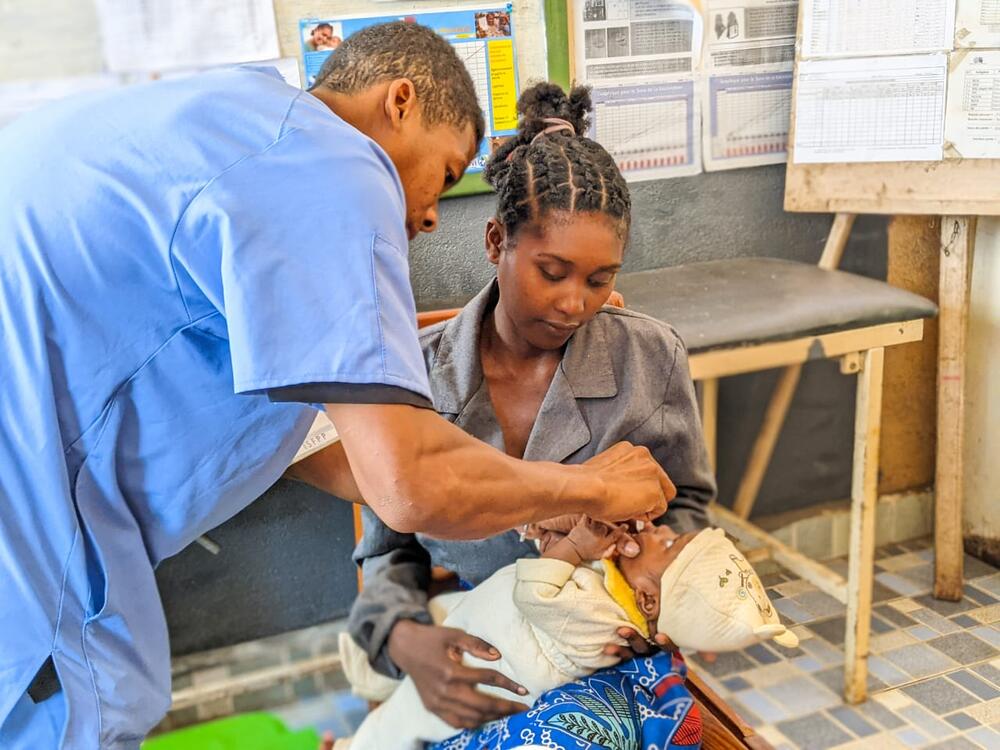News
Births don’t stop during a crisis: How one woman went into labour as Cyclone Freddy slammed into Madagascar
- 13 April 2023
News
MANAKARA, Madagascar – “We knew the delivery was imminent and that everything was going well... But we didn't know it was going to be today.” Georgette, a 26-year-old mother from Manakara in Madagascar, went into labour just as a powerful cyclone tore through her village.
Tropical Cyclone Freddy was expected to hit the east coast of Madagascar on 21 February, with Manakara one of the towns in its path. People living in areas at risk of destruction and landslides had been moved to safer ground and sturdier buildings well before the actual arrival of the cyclone: Five temporary shelters were set up to accommodate some 2,000 people in nearby Ambalavontaka, where Georgette, her mother and hundreds of other vulnerable people had taken refuge in a converted school compound.
The cyclone made landfall in Manakara around midnight, with fierce winds and rain tearing roofs off the shelters and bringing down flimsier houses. But for Georgette there was a bigger emergency at hand, as her contractions quickened and she took refuge in the shelter’s bathroom to give birth to her second child.
More than 400,000 people have been affected by the cyclone in Madagascar, including over 30,000 pregnant women, 1000 of whom will deliver in the next three months – just as many health services are inaccessible or severely damaged.
Comprehensive care in crisis
With an already under-resourced health-care system, Madagascar contends with a high maternal death rate and many people are unable to meet their family planning needs. Fewer than half of all births are attended by qualified personnel, the country has high numbers of unintended pregnancies and thousands of women suffer devastating birth injuries such as obstetric fistula.
Georgette was assisted by her mother, Julienne, and Tsara, a 94-year-old traditional birth attendant who was among those displaced in the accommodation site. Once the gales had subsided in the early hours of the morning, the local health centre was alerted so the mother and her newborn, named Freddy, could receive critical postnatal care.

Lydia Rabitarivao, the Maroalakely health centre’s head midwife, told UNFPA, “We examined Georgette and Freddy, both are doing very well. We gave them all the necessary first aid and went back in the afternoon for a check-up. For the next three days they will receive free health care here.”
UNFPA supports the health centre with essential sexual and reproductive health supplies, such as clean delivery kits for midwives and doctors to use, and post-rape treatment kits for survivors of sexual violence. Georgette also received a UNFPA maternal hygiene kit containing soap, cloths, diapers, a toothbrush and toothpaste, towels and a basin. “This kit really meets our needs and came at the right time. It completes what we were unable to buy,” explained Julienne.
Thousands of women and girls at risk without services
Georgette and Freddy have since returned home, and she said she plans to resume contraception as soon as possible through the health centre, where she also had her prenatal consultations. More than 370 women gave birth at the centre in 2022, receiving comprehensive antenatal and postnatal care and advice throughout their pregnancies.
UNFPA has been working in Madagascar for more than 40 years, and the Maroalakely centre is one of some 132 health local district health centres supported by the organization to provide sexual and reproductive health services.
Through mobile clinics and health centres, UNFPA is distributing dignity kits to women and girls affected by the cyclone, holding information and awareness-raising sessions on the risks of and resources to recover from gender-based-violence, and providing psychological counselling for traumatized survivors of the crisis, many of whom have lost all their possessions in the disaster.